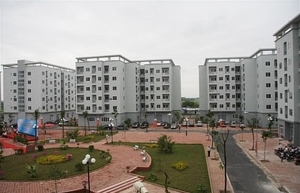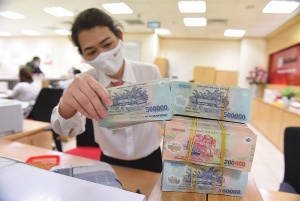Nudge needed for home loan gains
Homebuyers in Vietnam are currently experiencing a range of low-interest loan packages. According to last week’s updates, at Vietcombank, individuals can enjoy preferential interest rates starting from 6 per cent per annum for short-term loans (under 12 months) or 6.3 per cent per annum for medium to long-term loans in the first six months. After the preferential period, the floating interest rate is approximately 9 per cent per annum, adjusted every three months.
 |
| Nudge needed for home loan gains, illustration photo/ Source: freepik.com |
PVcomBank has introduced an attractive loan package for homebuyers with interest rates starting from just 3.99 per cent per annum. Similarly, Sacombank has launched a recovery loan package, including home loans, for individual customers, with interest rates starting from 6.5 per cent per annum.
Foreign banks such as Woori, Shinhan, Hong Leong, UOB, and Standard Chartered have also adjusted their loan interest rates, ranging from 5.5 to 6.8 per cent per annum, depending on the term.
Despite these low-interest rates, credit growth in the real estate sector remains sluggish, primarily because potential homebuyers believe property prices are still too high. According to batdongsan.com.vn, in the first half of 2024, apartment prices in Ho Chi Minh City increased by 6 per cent compared to the same period last year, while in Hanoi, prices surged by 31 per cent. Prices of private houses also rose by 32 per cent compared to the first half of 2023.
Le Bao Long, chief strategy officer at batdongsan.com.vn, commented, “Despite the attractive loan packages, many potential buyers are hesitant to take on large loans due to the high property prices. The market is still in a wait-and-see mode, with many expecting further price adjustments and clearer signals from new regulations.”
Experts are optimistic that the demand for real estate investment loans will improve once three new laws on housing, real estate business, and land come into effect. Pham Nhu Anh, CEO of MB, noted that banks have reduced interest rates to their lowest levels in the past decade.
“Lower capital costs will stimulate credit demand, and thus, banks will continue to cut costs to support lending at low interest rates,” Anh said. “The real estate market will grow strongly once legal issues are resolved, and improved supply will encourage people to buy or upgrade homes, driving better credit growth for banks.”
Trinh Bang Vu, head of Retail Lending at Shinhan Bank Vietnam, highlighted three critical aspects of real estate credit: customer demand for housing, property prices, and borrowers’ repayment capacity.
“Currently, the demand for housing in urban areas of Vietnam, particularly in Ho Chi Minh City and Hanoi, is substantial. However, recent legal hurdles in the real estate sector have significantly decreased market supply, driving property prices up with no signs of cooling down,” Vu said.
Despite significant improvements in income over the past five years, it has not kept pace with the surge in property prices, noted Vu.
“Moreover, the economic challenges of the past two years have impacted income and purchasing power, making it difficult for people to manage large loans for home purchases. This creates significant repayment pressure on borrowers and their families, limiting the banks’ ability to boost credit growth at this time,” he added.
A senior executive at a commercial joint-stock bank in Ho Chi Minh City observed that interest rates are not the primary issue in boosting real estate credit.
“The main challenge is the lack of market liquidity, which means idle capital is not flowing into the real estate sector,” he said.
On the other hand, some market watchdogs suggest that lending rates could decrease further in the coming months, despite rising input rates.
Bui Thi Thao Ly, head of Analysis at Shinhan Securities, noted that in Ho Chi Minh City, the real estate supply is at its lowest in 15 years, leaving the market with little to sell. This is one of the reasons why real estate credit growth has been sluggish and below expectations.
“On a positive note, many businesses plan to launch new projects from now until the end of the year, increasing market supply and offering more options for investors,” Ly said. “Lending rates may decrease by 0.5 percentage points compared to the current level to stimulate credit growth, with commercial banks likely having to accept a slight reduction or stagnation in net interest margins compared to last year.”
 | Banks cut home loan interest rates Interest rates of home loans at commercial banks have tended to reduce significantly since the second half of July due to low capital demand from business and production. |
 | Lower lending rates stimulating demand for home loans Banks competing over new lending rates under 6 per cent per year have stimulated a resurgence in demand for housing credit. |
What the stars mean:
★ Poor ★ ★ Promising ★★★ Good ★★★★ Very good ★★★★★ Exceptional
Related Contents
Latest News
More News
- An Phat 5 Industrial Park targets ESG-driven investors in Hai Phong (January 26, 2026 | 08:30)
- Decree opens incentives for green urban development (January 24, 2026 | 11:18)
- Public investment is reshaping real estate’s role in Vietnam (January 21, 2026 | 10:04)
- Ho Chi Minh City seeks investor to revive Binh Quoi–Thanh Da project (January 19, 2026 | 11:58)
- Sun Group launches construction of Rach Chiec sports complex (January 16, 2026 | 16:17)
- CEO Group breaks ground on first industrial park in Haiphong Free Trade Zone (January 15, 2026 | 15:47)
- BRIGHTPARK Entertainment Complex opens in Ninh Binh (January 12, 2026 | 14:27)
- Ho Chi Minh City's industrial parks top $5.3 billion investment in 2025 (January 06, 2026 | 08:38)
- Why Vietnam must build a global strategy for its construction industry (December 31, 2025 | 18:57)
- Housing operations must be effective (December 29, 2025 | 10:00)

 Tag:
Tag:



















 Mobile Version
Mobile Version